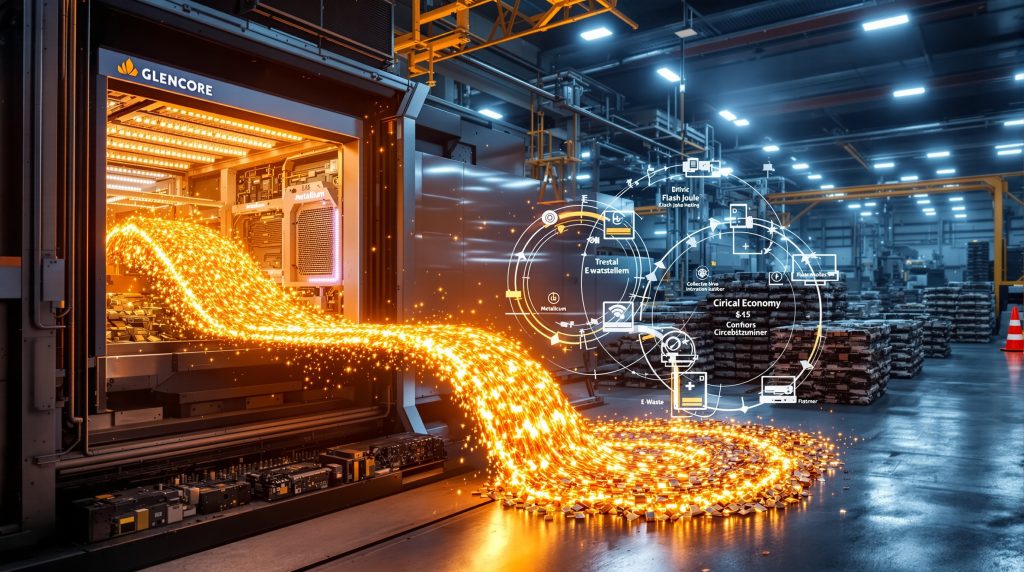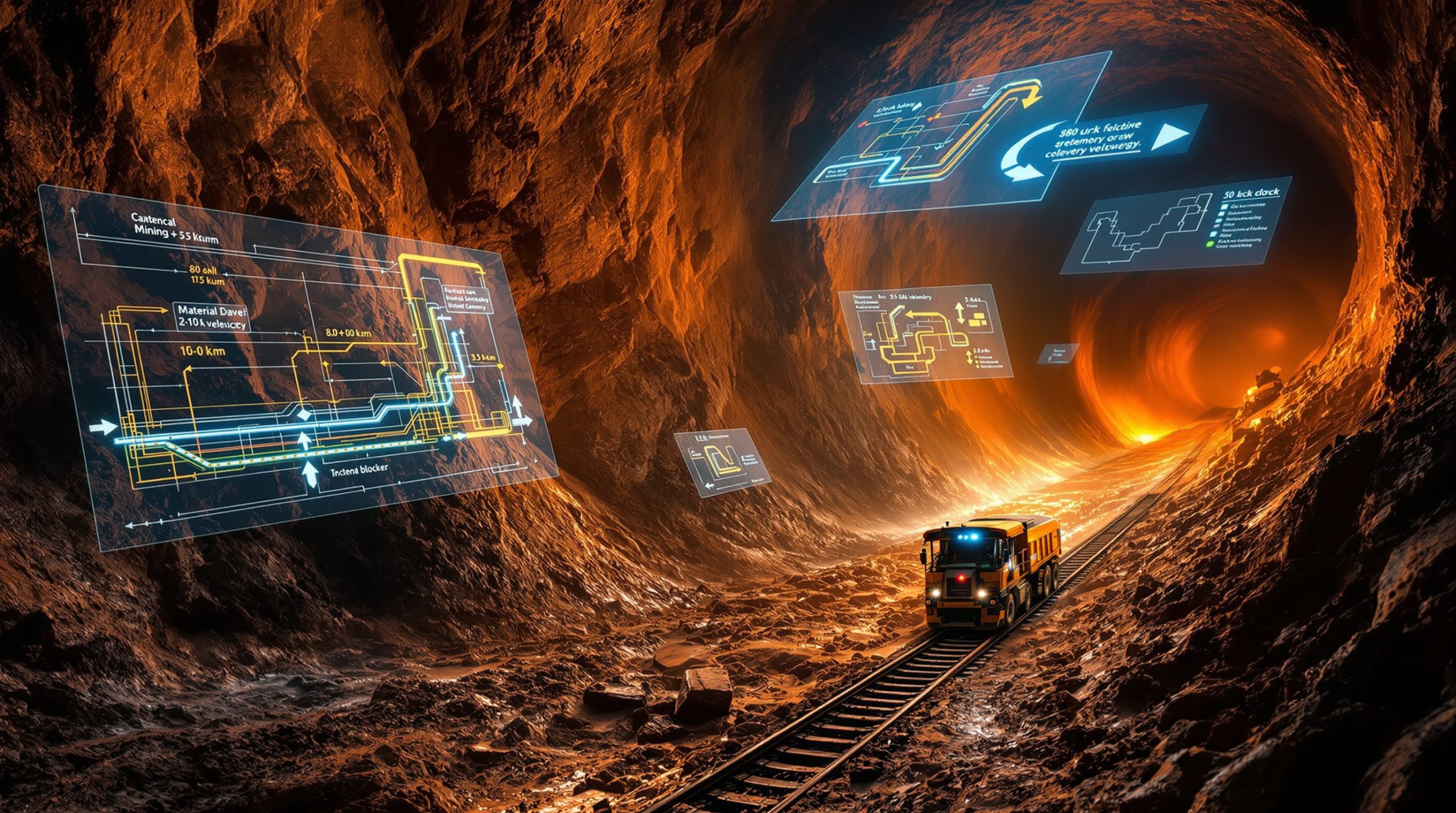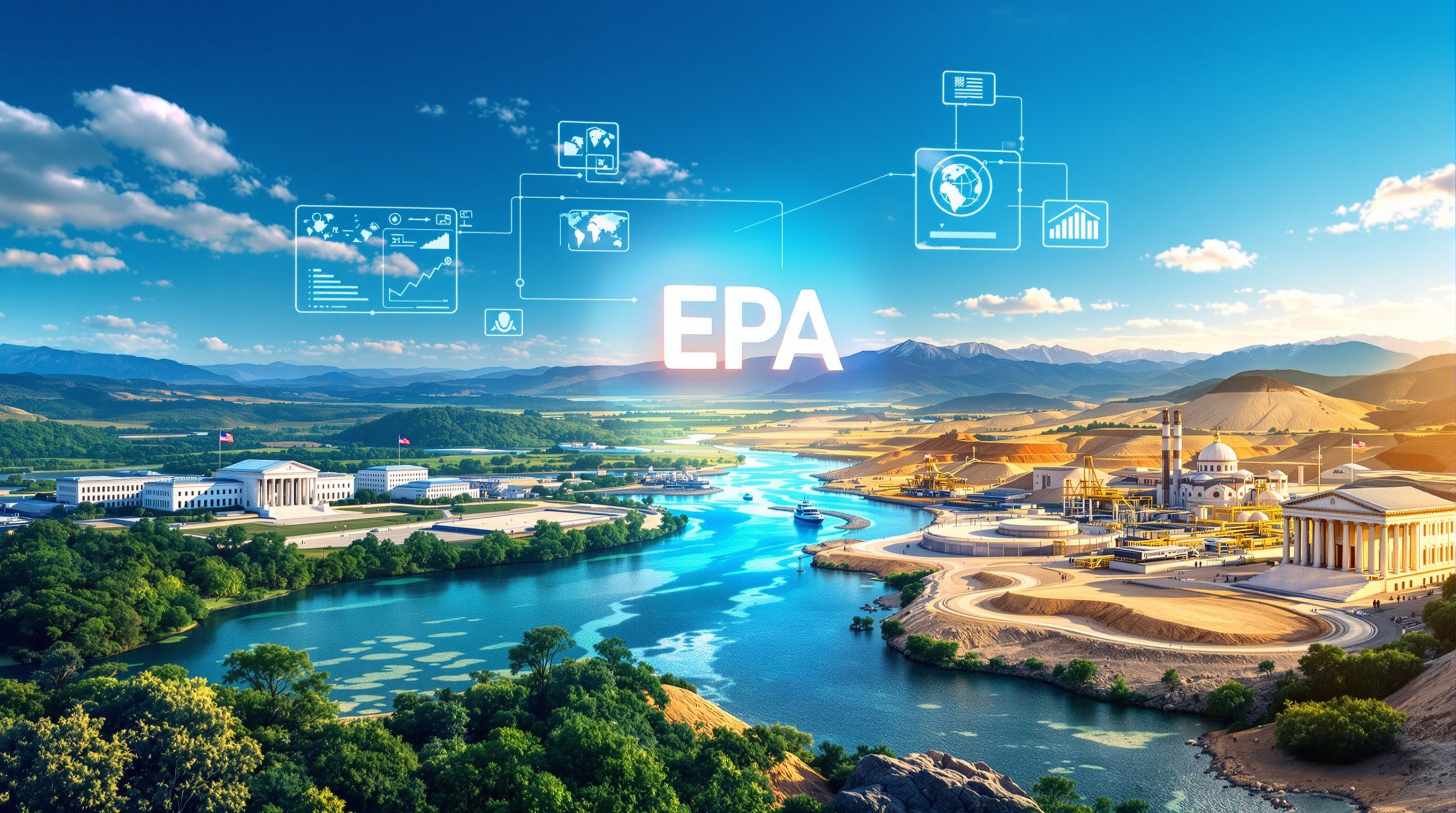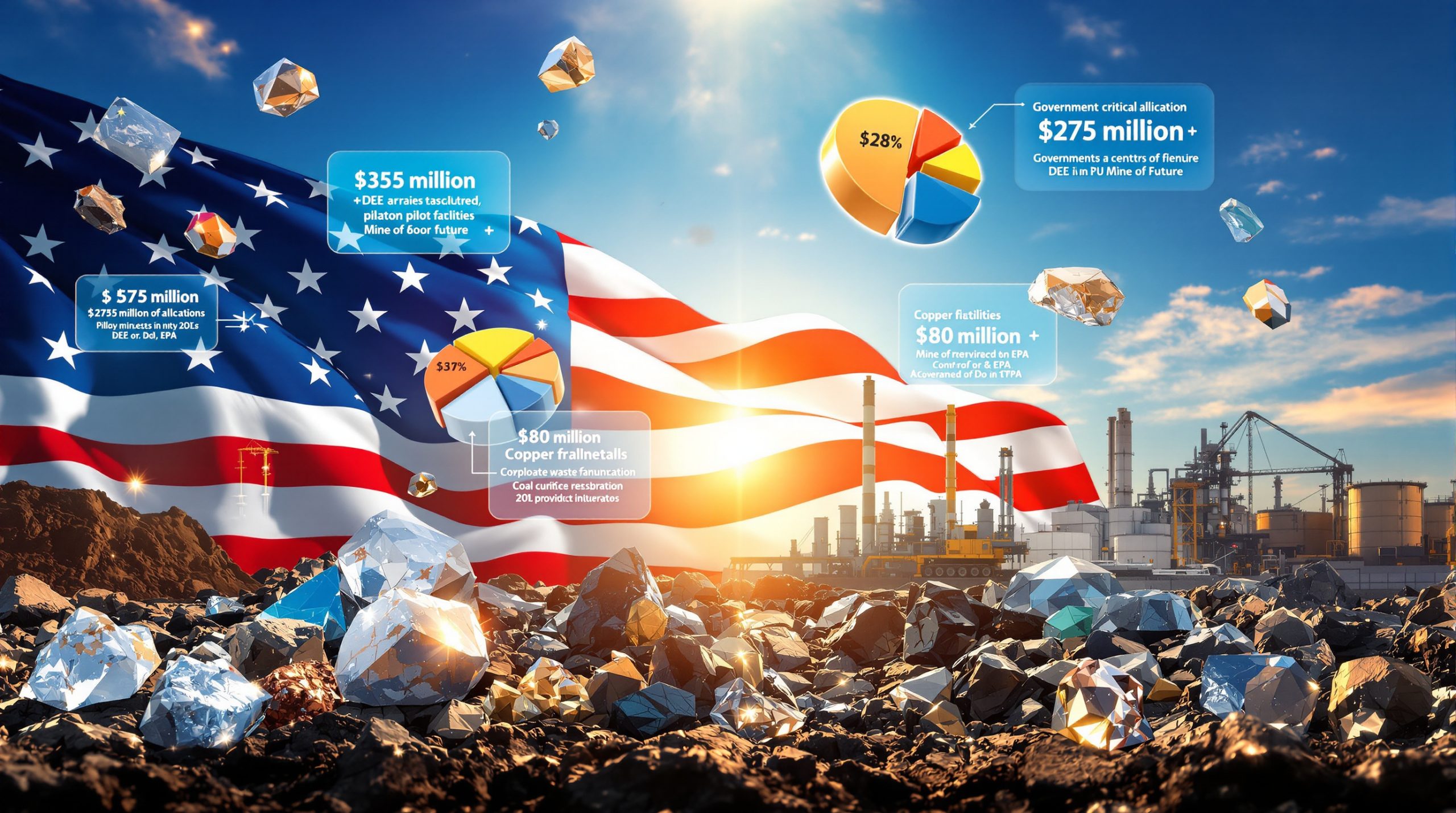Metallium-Glencore Partnership: Strategic Alliance Reshaping Critical Metals Recycling
The Metallium-Glencore partnership has rapidly emerged as a transformative alliance in the critical metals recycling sector, capturing significant market attention. Following the announcement of this strategic collaboration, Metallium (ASX: MTM) shares surged an impressive 23%, highlighting strong investor confidence in the potential of this relationship to drive future growth and innovation in sustainable resource management.
What is the Metallium-Glencore Partnership?
At its core, the partnership between Metallium and Glencore represents a comprehensive approach to electronic waste recycling. Through this strategic alliance, Glencore will supply electronic waste materials to Metallium's battery recycling facility in Texas, while simultaneously committing to purchase 75% of the recycled materials produced through Metallium's innovative processing technology.
This arrangement creates a closed-loop system that addresses two fundamental challenges typically faced by emerging recycling technology companies: securing reliable feedstock supply and establishing guaranteed sales channels for processed materials. For Metallium, this means stability in both input materials and output markets – a rare advantage for companies at this stage of development.
The current agreement exists as a non-binding memorandum of understanding, with both companies actively working toward converting it into a definitive commercial contract by the end of 2025, contingent upon successful demonstration plant operation and performance validation.
How Does the Partnership Benefit Both Companies?
This collaboration establishes a symbiotic relationship that delivers distinct advantages to both organizations while supporting their respective strategic objectives.
Key Benefits Table
| Benefit for Metallium | Benefit for Glencore |
|---|---|
| Secured feedstock supply | Access to innovative recycling technology |
| Guaranteed offtake for 75% of production | Expanded e-waste processing capabilities |
| Market validation from industry leader | Sustainable source of critical metals |
| Potential for future expansion | Strengthened circular economy credentials |
| Reduced market risk | Diversification of metal sourcing methods |
For Metallium, partnering with one of the world's largest diversified resource companies provides significant market validation of its technology and approach. The agreement not only secures operational stability through guaranteed feedstock and offtake but also enhances investor confidence in the company's long-term potential.
For Glencore, the partnership expands its footprint in the growing electronic waste recycling market without requiring substantial capital investment in unproven technologies. By securing access to Metallium's innovative processing capabilities, Glencore can strengthen its position in sustainable material sourcing while diversifying its supply chain for critical minerals transition.
Importantly, the agreement's structure allows Metallium to independently market high-value specialty materials like gallium, germanium, indium, and rare earth elements, potentially enhancing profit margins beyond the base agreement with Glencore.
What Makes Metallium's Technology Valuable to Glencore?
Metallium's proprietary Flash Joule Heating technology represents a significant advancement in electronic waste processing, offering several competitive advantages over conventional recycling methods.
Technology Advantages
- Efficiency: The Flash Joule process operates at significantly higher speeds than conventional recycling methods, reducing processing time and increasing throughput capacity
- Resource Recovery: Capable of extracting a wider range of valuable elements, including rare earths and other critical minerals that are often lost in traditional processes
- Environmental Impact: Reduced energy consumption and emissions compared to traditional recycling processes, supporting sustainability objectives
- Scalability: Modular design allows for expansion as demand increases, providing flexibility in deployment and capacity growth
- Versatility: Can process various types of electronic waste streams, adapting to different input materials without major reconfiguration
The technology utilizes ultra-fast heating to break down electronic waste components, effectively separating valuable materials for recovery. While proven successful in laboratory settings, the upcoming demonstration plant will be crucial in validating its performance under real-world commercial conditions.
For Glencore, access to this technology provides a potential competitive advantage in sourcing critical metals through recycling rather than traditional mining, aligning with growing regulatory and market pressure for sustainable resource management.
How Will the Demonstration Plant Validate the Partnership?
Metallium's 2025 demonstration plant represents a critical milestone in cementing the relationship with Glencore and validating the commercial viability of the Flash Joule Heating technology.
Demonstration Plant Milestones
- Process design work completed
- Material flow mapping established
- Key equipment selection finalized
- Regulatory approvals secured
- Operations targeted for late 2025
This facility will serve as a smaller-scale version of Metallium's future commercial operations, demonstrating that the technology can perform consistently under real-world conditions with actual feedstock materials. The company has already completed significant preparatory work, including process design, material flow outlining, key equipment selection, and securing necessary regulatory approvals.
The demonstration plant's successful operation will be instrumental in converting the current memorandum of understanding into a binding commercial agreement by year-end 2025. For investors, this represents a critical inflection point where Metallium transitions from technology development to commercial execution – a transition that often separates successful innovative companies from those that struggle to scale.
What Materials Will Be Recovered Through This Partnership?
The Flash Joule Heating process enables the recovery of diverse valuable materials from electronic waste, creating a sustainable supply chain for critical metals that are increasingly essential for modern technologies.
Recovered Materials
- Metallic metals: Including copper, aluminum, gold, and silver – common in circuit boards and electronic components
- Metal chlorides: Precursors for various industrial applications including catalyst production
- Metal hydroxides: Used in battery manufacturing and other industries requiring high-purity metal compounds
- Specialty elements: Gallium, germanium, indium, and rare earth elements – critical for semiconductor manufacturing, display technologies, and renewable energy applications
The recovery of these materials addresses growing supply chain concerns for critical minerals, many of which face geopolitical supply risks or environmental challenges associated with traditional mining. By extracting these materials from existing waste streams, the partnership supports circular economy principles while reducing dependence on new extraction.
Importantly, while Glencore will purchase up to 75% of the recycled output, Metallium retains the right to independently market high-value specialty elements, potentially enhancing profit margins through targeted sales to specialty markets where these materials command premium prices.
How Does This Partnership Fit Into Global Resource Trends?
The Metallium-Glencore collaboration aligns perfectly with several major global trends in resource management and sustainability that are reshaping industrial practices and supply chains worldwide.
Alignment with Global Trends
- Circular Economy: Reduces dependence on primary mining by recovering materials from existing products, closing resource loops
- Supply Chain Security: Creates domestic sources of critical metals amid growing geopolitical concerns and trade restrictions
- Decarbonization: Recycled metals typically have lower carbon footprints than newly mined materials, supporting decarbonisation benefits for the industry
- Resource Efficiency: Maximizes value extraction from existing materials rather than discarding valuable resources
- Regulatory Compliance: Anticipates stricter requirements for responsible material sourcing and waste management
As governments worldwide implement more stringent regulations on electronic waste management and material recovery, partnerships like this position both companies advantageously for compliance and market leadership. The growing emphasis on sustainable sourcing, particularly for materials designated as "critical" by major economies including the US and EU, creates favorable market conditions for innovative recycling solutions.
Additionally, the increasing adoption of circular economy principles by major technology manufacturers creates downstream demand for verifiably recycled materials, potentially commanding premium pricing for materials recovered through advanced processes like Metallium's Flash Joule technology.
What Are the Investment Implications of This Partnership?
The market has responded positively to the Metallium-Glencore partnership announcement, with Metallium shares surging 23%. This reaction reflects investor recognition of several key factors that strengthen Metallium's investment case.
Investment Considerations
- Revenue Visibility: The offtake agreement provides clearer projections of future cash flows, reducing uncertainty about market access
- Reduced Execution Risk: Partnership with established player lowers operational uncertainties around feedstock supply and product sales
- Expansion Potential: Success could lead to additional facilities and partnerships as the model proves viable
- Market Validation: Glencore's involvement signals technology credibility and commercial potential
- Competitive Positioning: Early-mover advantage in advanced e-waste processing creates potential barriers to entry for competitors
For investors, the partnership transforms Metallium's profile from a pure technology development play to a company with a clear path to commercialization supported by an industry leader. This transition typically reduces risk premiums and can support higher valuations as execution milestones are achieved.
The company's April report noted discussions with eight potential partner companies, suggesting the possibility of additional collaborations that could further strengthen Metallium's market position and growth trajectory. Such partnerships could potentially involve different waste streams, geographic regions, or specialized applications of the Flash Joule technology.
What Challenges Remain for the Partnership?
Despite the positive outlook, several challenges must be addressed for the partnership to realize its full potential and deliver on investor expectations.
Key Challenges
- Technology Scale-up: Demonstrating consistent performance at commercial scale remains the most significant hurdle
- Feedstock Quality: Ensuring consistent e-waste composition for optimal processing will require careful supply chain management
- Regulatory Landscape: Navigating evolving regulations around e-waste handling across different jurisdictions
- Market Development: Creating demand channels for all recovered materials beyond the Glencore offtake agreement
- Competition: Other emerging technologies in the e-waste recycling space could potentially leapfrog current approaches
The most immediate challenge is the successful deployment and operation of the demonstration plant. While the Flash Joule technology has shown promise in controlled laboratory environments, translating this performance to commercial-scale operations with variable feedstock quality presents engineering and operational challenges.
Additionally, the current agreement remains non-binding until Metallium can convert it into a definitive contract by the end of 2025. Failure to achieve this milestone could negatively impact investor confidence and the company's share price, which now reflects expectations of successful commercialization.
What's Next for the Metallium-Glencore Collaboration?
The partnership is poised for significant developments in the coming months as both companies work toward operationalizing their agreement and validating the technology at commercial scale.
Near-Term Milestones
- Completion of the demonstration plant construction
- Initial operational testing and optimization
- Performance validation with Glencore-supplied feedstock
- Negotiation of definitive commercial agreements
- Potential expansion planning based on demonstration results
The most critical near-term objective is completing the demonstration plant and beginning operations by late 2025. This facility will serve as the proving ground for the Flash Joule Heating technology under real-world conditions, using actual electronic waste streams provided by Glencore.
Successful demonstration of the technology at this scale would likely trigger the conversion of the current memorandum of understanding into a binding commercial agreement, creating a solid foundation for long-term collaboration and potential expansion into additional facilities or waste streams.
How Does This Partnership Compare to Other Industry Collaborations?
The Metallium-Glencore partnership represents a distinctive model for collaboration between technology innovators and established resource companies, offering several advantages over traditional industry relationships.
Comparative Advantages
- Integrated Approach: Combines feedstock supply and product offtake in a single arrangement, creating alignment of interests
- Technology Focus: Centers on proprietary processing technology rather than traditional mining assets or conventional recycling methods
- Specialty Materials: Targets high-value critical materials rather than bulk commodities, potentially delivering superior margins
- Flexible Structure: Allows Metallium to independently market certain high-value products, optimizing overall returns
Unlike many industry partnerships that focus solely on either supply or offtake, this collaboration creates a complete value chain from waste collection to processed material marketing. This integrated approach reduces transaction costs and market risks while aligning incentives between the partners.
The technology-centric nature of the partnership also distinguishes it from traditional resource sector collaborations that typically focus on asset ownership or development. By combining Glencore's global reach and market access with Metallium's innovative technology, the partnership leverages complementary strengths while advancing green energy mining principles.
FAQ: Metallium-Glencore Partnership
What is the current status of the Metallium-Glencore agreement?
The current agreement is a non-binding memorandum of understanding, with both companies working toward converting it into a definitive commercial contract by the end of 2025, contingent on successful demonstration plant operation.
Will Glencore take an equity stake in Metallium?
The current agreement does not include an equity investment component, focusing instead on the commercial relationship of feedstock supply and product offtake. However, successful technology demonstration could potentially lead to deeper investment relationships.
How many other potential partnerships is Metallium pursuing?
According to Metallium's April report, the company is in discussions with eight additional companies regarding potential partnerships or collaborations. These discussions could potentially involve different geographic regions, waste streams, or applications of the Flash Joule technology.
What happens if the demonstration plant doesn't perform as expected?
Underperformance could delay or prevent the conversion of the MoU into a binding agreement, potentially impacting Metallium's revenue projections and share price. The company would likely need to address technical issues and potentially modify its approach to meet performance targets.
How does this partnership affect Metallium's intellectual property?
Metallium retains full ownership of its Flash Joule Heating technology intellectual property, with the partnership focused on commercial implementation rather than technology transfer. This maintains Metallium's long-term strategic position and ability to pursue additional partnerships.
What regulatory approvals are required for the demonstration plant?
The company has already secured the necessary regulatory approvals for the demonstration plant, including environmental permits and operational licenses. These approvals address waste handling, emissions controls, and facility operations.
Further Exploration:
Investors and industry observers interested in learning more about developments in critical metals recycling and resource partnerships can explore related educational content on renewable energy transformation initiatives, circular economy initiatives, and technology-driven solutions for electronic waste processing.
Disclaimer: This article contains analysis of publicly traded companies and markets. The information presented is based on current data and industry knowledge but should not be considered investment advice. Readers should conduct their own research and consult with financial advisors before making investment decisions. Market conditions and company performance can change rapidly, affecting the accuracy of projections and analysis.
Want to Discover the Next Major Mining Breakthrough?
Stay ahead of the market with Discovery Alert's proprietary Discovery IQ model, delivering instant notifications of significant ASX mineral discoveries like the Metallium-Glencore partnership. Visit our discoveries page to understand how major mineral findings can generate exceptional returns and start your 30-day free trial today.




